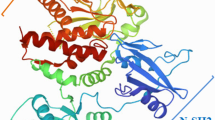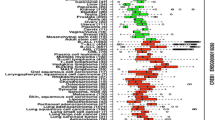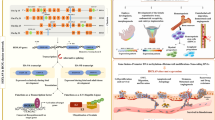Abstract
The Rho family of GTPases have emerged as key players in regulating a diverse set of biological activities including actin organization, focal complex/adhesion assembly, cell motility, cell polarity, gene transcription and cell-cycle progression. Some Rho GTPases and their signaling components are overexpressed and/or are hyperactive in breast cancer and recent studies have shown a requirement for Rho GTPases in breast cancer cell metastasis in vivo. Herein we describe the contribution of Rho GTPase to the malignant phenotype of breast cancer cells and the role of these pathways as potential targets for breast cancer therapy. Rho GTPases promote cell-cycle progression through cyclin D1, and cyclin D1 in turn reduces cellular adhesion and promotes migration, an example of ‘inside-out’ signaling by cyclin D1. As cyclin D1 overexpression correlates with metastatic cancer, the ‘inside-out’ signaling function of cyclin D1 to promote cell migration may represent a useful new therapeutic target.
Similar content being viewed by others
References
Hall A: Rho GTPases and the actin cytoskeleton. Science 279: 509–514, 1998
Ridley AJ, Paterson HF, Johnston CL, Diekmann D, Hall A: The small GTP-binding protein rac regulates growth factorinduced membrane ruffling. Cell 70: 401–410, 1992
Ridley AJ, Hall A: The small GTP-binding protein rho regulates the assembly of focal adhesions and actin stress fibers in response to growth factors. Cell 70: 389–399, 1992
Bishop AL, Hall A: Rho GTPases and their effector proteins. Biochem J 348(Pt 2): 241–255, 2000
Olofsson B: Rho guanine dissociation inhibitors: pivotal molecules in cellular signalling. Cell Signal 11: 545–554, 1999
Whitehead IP, Campbell S, Rossman KL, Der CJ: Dbl family proteins. Biochim Biophys Acta 1332: F1-F23, 1997
Zheng Y: Dbl family guanine nucleotide exchange factors. Trends Biochem Sci 26: 724–732, 2001
Peck J, Douglas IV G, Wu CH, Burbelo PD: Human RhoGAP domain-containing proteins: structure, function and evolutionary relationships. FEBS Lett 528: 27–34, 2002
Fritz G, Brachetti C, Bahlmann F, Schmidt M, Kaina B: Rho GTPases in human breast tumours: expression and mutation analyses and correlation with clinical parameters. Br J Cancer 87: 635–644, 2002
Fritz G, Just I, Kaina B: Rho GTPases are over-expressed in human tumors. Int J Cancer 81: 682–687, 1999
van Golen KL, Davies S, Wu ZF, Wang Y, Bucana CD, Root H, Chandrasekharappa S, Strawderman M, Ethier SP, Merajver SD: A novel putative low-affinity insulin-like growth factorbinding protein, LIBC (lost in inflammatory breast cancer), and RhoC GTPase correlate with the inflammatory breast cancer phenotype. Clin Cancer Res 5: 2511–2519, 1999
Kleer CG, van Golen KL, Zhang Y, Wu ZF, Rubin MA, Merajver SD: Characterization of RhoC expression in benign and malignant breast disease: a potential new marker for small breast carcinomas with metastatic ability. Am J Pathol 160: 579–584, 2002
Clark EA, Golub TR, Lander ES, Hynes RO: Genomic analysis of metastasis reveals an essential role for RhoC. Nature 406: 532–535, 2000
Schnelzer A, Prechtel D, Knaus U, Dehne K, Gerhard M, Graeff H, Harbeck N, Schmitt M, Lengyel E: Rac1 in human breast cancer; overexpression, mutation analysis, and characterization of a new isoform, Rac1b. Oncogene 19: 3013–3020, 2000
Mira JP, Benard V, Groffen J, Sanders LC, Knaus UG: Endogenous, hyperactive Rac3 controls proliferation of breast cancer cells by a p21-activated kinase-dependent pathway. Proc Natl Acad Sci USA 97: 185–189, 2000
Evers EE, Zondag GCM, Malliri A, Price LS, ten Klooster J-P, van der Kammen RA, Collard JG: Rho family of proteins in cell adhesion and cell migration. Eur J Cancer 36: 1269–1274, 2000
Keely PJ, Westwick JK, Whitehead IP, Der CJ, Parise LV: Cdc42 and Rac1 induce integrin-mediated cell motility and invasiveness through PI(3)K. Nature 390: 632–636, 1997
van Golen KL, Bao LW, Pan Q, Miller FR, Wu ZF, Merajver SD: Mitogen activated protein kinase pathway is involved in RhoC GTPase induced motility, invasion and angiogenesis in inflammatory breast cancer. Clin Exp Metast 19: 301–311, 2002
van Golen KL, Wu ZF, Qiao XT, Bao L, Merajver SD: RhoC GTPase overexpression modulates induction of angiogenic factors in breast cells. Neoplasia 2: 418–425, 2000
Bouzahzah B, Albanese C, Ahmed F, Pixley F, Lisanti MP, Segall JD, Condeelis J, Joyce D, Minden A, Der CJ, Chan A, Symons M, Pestell RG: Rho family GTPases regulate mammary epithelium cell growth and metastasis through distinguishable pathways. Mol Med 7: 816–830, 2001
Olson MF, Ashworth A, Hall A: An essential role for Rho, Rac and Cdc42 GTPases in cell cycle progression through G1. Science 269: 1270–1272, 1995
Qiu R-G, Chen J, McCormick F, Symons M: A role for Rho in Ras transformation. Proc Natl Acad Sci USA 92: 11781–11785, 1995
Westwick JK, Lambert QT, Clark GJ, Symons M, Van Aelst L, Pestell RG, Der CJ: Rac regulation of transformation, gene expression and actin organisation by multiple, PAKindependent pathways. Mol Cell Biol 17: 1324–1335, 1997
Westwick JK, Lee RJ, Lambert QT, Symons M, Pestell RG, Der CJ, Whitehead IP: Transforming potential of Dbl family proteins correlates with transcription from the cyclin D1 promoter but not with activation of Jun NH2-terminal kinase, p38/Mpk2, serum response factor, or c-Jun. J Biol Chem 273: 16739–16747, 1998
Whitehead IP, Lambert QT, Glaven JA, Abe K, Rossman KL, Mahon GM, Trzaskos JM, Kay R, Campbell SL, Der CJ: Dependence of Dbl and Dbs transformation on MEK and NF-κ activation. Mol Cell Biol 19: 7759–7770, 1999
Liberto M, Cobrinik D, Minden A: Rho regulates p21(CIP1), cyclin D1, and checkpoint control inmammary epithelial cells. Oncogene 21: 1590–1599, 2002
Lee RJ, Albanese C, Fu M, D'Amico M, Lin B, Watanabe G, Haines GKI, Siegel PM, Hung MC, Yarden Y, Horowitz JM, Muller WJ, Pestell RG: Cyclin D1 is required for transformation by activated Neu and is induced through an E2Fdependent signaling pathway. Mol Cell Biol 20: 672–683, 2000
Joyce D, Bouzahzah B, Fu M, Albanese C, D'Amico M, Steer J, Klein JU, Lee RJ, Segall JE, Westwick JK, Der CJ, Pestell RG: Integration of Rac-dependent regulation of cyclin D1 transcription through an NF-κ-dependent pathway. J Biol Chem 274: 25245–25249, 1999
Albanese C, Jarrett CR, Joyce D, Hughes J, Wu K, D'Amico M, Fu M, Sakamaki T, Ben Ze'ev A, Lamberti C, Lin K-M, Gaynor RB, Byers SW, Pestell RG: IKKá activates Tcf signaling and cyclin D1 gene expression through phosphorylation of β-catenin. Mol Cell Biol (in press)
Guttridge DC, Albanese C, Reuther JY, Pestell RG, Baldwin AS: NF-κ controls cell growth and differentiation through the transcriptional regulation of cyclin D1. Mol Cell Biol 19: 5785–5799, 1999
Salh B, Marotta A, Wagey R, Sayed M, Pelech S: Dysregulation of phosphatidylinositol 3-kinase and downstream effectors in human breast cancer. Int J Cancer 98: 148–154, 2002
Vadlamudi RK, Adam L, Wang RA, Mandal M, Nguyen D, Sahin A, Chernoff J, Hung MC, Kumar R: Regulatable expression of p21-activated kinase-1 promotes anchorageindependent growth and abnormal organization of mitotic spindles in human epithelial breast cancer cells. J Biol Chem 275: 36238–36244, 2000
Adam L, Vadlamudi R, Kondapaka SB, Chernoff J, Mendelsohn J, Kumar R: Heregulin regulates cytoskeletal reorganization and cell migration through the p21-activated kinase-1 via phosphatidylinositol-3 kinase. J Biol Chem 273: 28238–28246, 1998
Adam L, Vadlamudi R, Mandal M, Chernoff J, Kumar R: Regulation of microfilament reorganization and invasiveness of breast cancer cells by kinase dead p21-activated kinase-1. J Biol Chem 275: 12041–12050, 2000
Uruno T, Liu J, Zhang P, Fan YX, Egile C, Li R, Mueller SC, Zhan X: Activation of Arp2/3 complex-mediated actin polymerization by cortactin. Nat Cell Biol 3: 259–266, 2001
Itoh K, Yoshioka K, Akedo H, Uehata M, Ishizaki T, Narumiya S: An essential part for Rho-associated kinase in the transcellular invasion of tumor cells. Nat Med 5: 221–225, 1999
Yoshioka K, Nakamori S, Itoh K: Overexpression of small GTP-binding protein RhoA promotes invasion of tumor cells. Cancer Res 59: 2004–2010, 1999
Nguyen QD, Faivre S, Bruyneel E, Rivat C, Seto M, Endo T, Mareel M, Emami S, Gespach C: RhoA-and RhoDdependent regulatory switch of Galpha subunit signaling by PAR-1 receptors in cellular invasion. Faseb J 16: 565–576, 2002
Sahai E, Marshall CJ: ROCK and Dia have opposing effects on adherens junctions downstream of Rho. Nat Cell Biol 4: 408–415, 2002
Prendergast GC: ‘Actin’ up: RhoB in cancer and apoptosis. Nat Rev Cancer 1: 162–168, 2001
Du W, Prendergast GC: Geranylgeranylated RhoB mediates suppression of human tumor cell growth by farnesyltransferase inhibitors. Cancer Res 59: 5492–5496, 1999
Denoyelle C, Vasse M, Korner M, Mishal Z, Ganne F, Vannier JP, Soria J, Soria C: Cerivastatin, an inhibitor of HMGCoA reductase, inhibits the signaling pathways involved in the invasiveness and metastatic properties of highly invasive breast cancer cell lines: an in vitro study. Carcinogenesis 22: 1139–1148, 2001
Nheu TV, He H, Hirokawa Y, Tamaki K, Florin L, Schmitz ML, Suzuki-Takahashi I, Jorissen RN, Burgess AW, Nishimura S, Wood J, Maruta H: The K252a derivatives, inhibitors for the PAK/MLK kinase family selectively block the growth of RAS transformants. Cancer J 8: 328–336, 2002
Hendrik Gille H, Downward J: Multiple ras effector pathways contribute to G1 cell cycle progression. J Biol Chem 274: 22033–22040, 1999
Holnthoner W, Pillinger M, Groger M, Wolff K, Ashton AW, Albanese C, Neumeister P, Pestell RG, Petzelbauer P: Fibroblast growth factor-2 induces Lef/Tcf-dependent transcription in human endothelial cells. J Biol Chem 277: 45847–45853, 2002
Neumeister P, Pixley FJ, Xiong Y, Xie H, Wu K, Ashton A, Cammer M, Chan A, Symons M, Stanley ER, Pestell RG: Cyclin D1 governs adhesion and motility of macrophages. Mol Biol Cell 14: 2005–2015, 2003
Author information
Authors and Affiliations
Rights and permissions
About this article
Cite this article
Burbelo, P., Wellstein, A. & Pestell, R.G. Altered Rho GTPase Signaling Pathways in Breast Cancer Cells. Breast Cancer Res Treat 84, 43–48 (2004). https://doi.org/10.1023/B:BREA.0000018422.02237.f9
Issue Date:
DOI: https://doi.org/10.1023/B:BREA.0000018422.02237.f9




